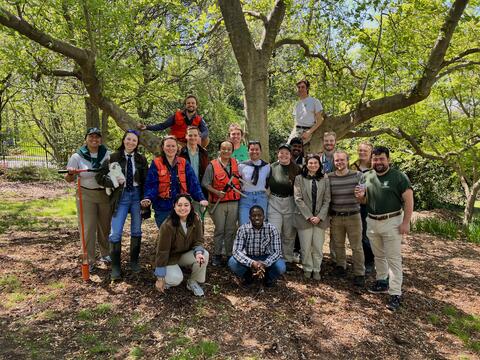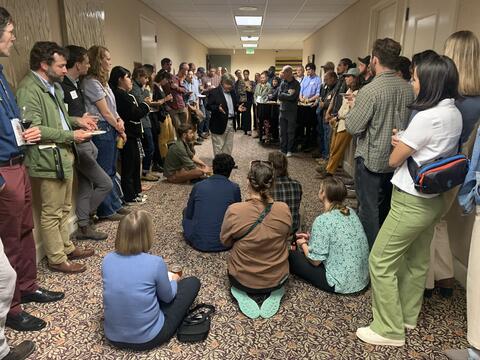
By: Wyatt Klipa ’23 MEM
In late October, as the winds chilled the air and the rain fell constant in the Northeast, forestry students and staff escaped New Haven and journeyed to Sacramento, California, for a week of professional development, connection, and learning. The 2023 Society of American Foresters (SAF) National Convention took place from October 24-28 in the capital of the Golden State, where forestry professionals, academics, students, and more all gathered under the guiding theme of “Forestry: It’s in Our DNA.” Supported by the Yale Temperate Forestry student interest group, which is The Forest School at the Yale School of the Environment’s SAF Student Chapter, over 20 students attended this year’s national convention alongside eight staff and faculty.
The conference kicked off with a blast, as the annual SAF Quiz Bowl took place on opening night. Represented by Mary Katherine DeWane ‘24 MF/MBA and Diana Satkauskas ’24 MF, The Forest School (TFS) competed against teams from 32 universities, testing knowledge of forestry, natural resources, silviculture, geology, operations, and more. The pair advanced from the group stage into the quarterfinals where they bowed out after a hard-fought match against the University of Vermont – the eventual quiz bowl champions.
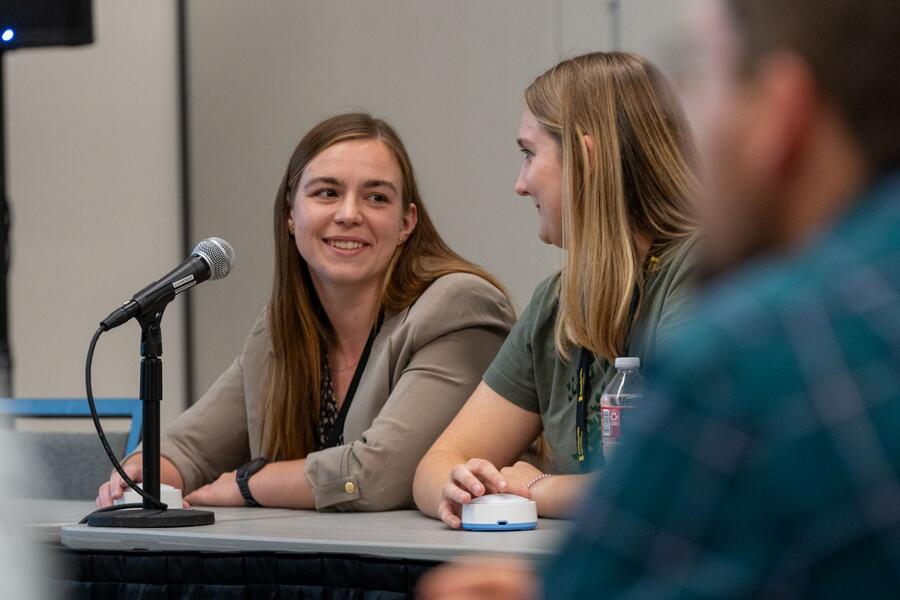
Mary Katherine DeWane ’24 MF/MBA (left) and Diana Satkauskas ’24 MF deliberate over the answer to a question in the quarterfinal round of the Quiz Bowl. Photo: Wasim Muklashy, SAF.
However, there was much more to the conference experience than fun and games. Each attending student spent time at The Forest School’s booth in the expo hall, connecting with other attendees to share information about academic programs and initiatives at the School. Students also explored the myriad other booths throughout the conference – including those of other academic institutions, forest products companies, and potential future employers in every sector from federal land management agencies to carbon registries to industrial timber to remote sensing.
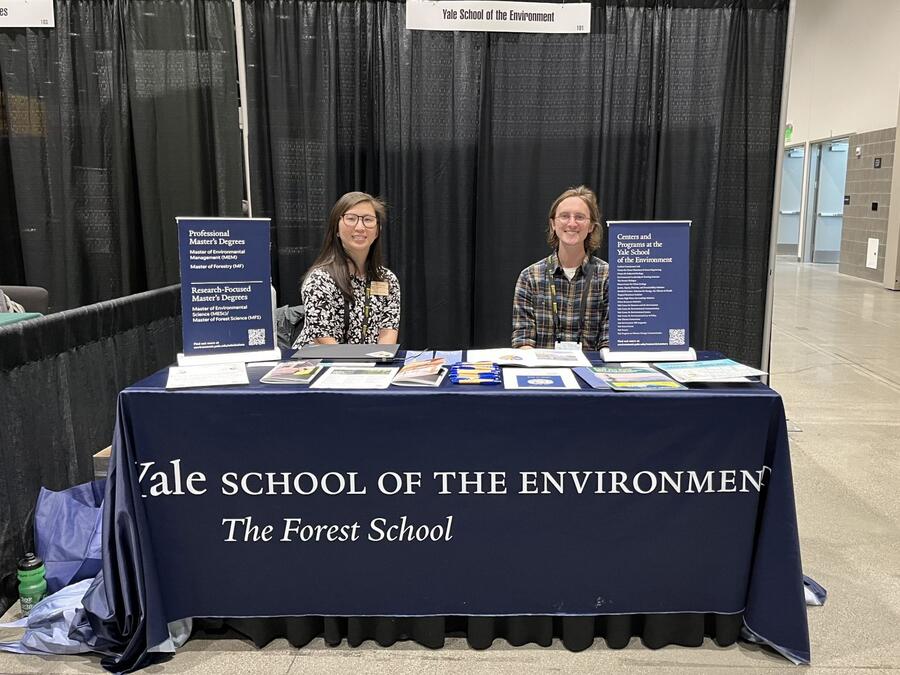
Amanda Friedman, assistant director of admissions, events, & recruitment, (left) and Jacob Peters, doctoral student, work a shift at the TFS booth in the exposition hall, connecting with conference attendees and sharing information on academic programs. Photo: Yeim We ’24 MFS.
Over the course of the three-day conference, numerous Yale students and recent alumni shared their work with SAF attendees. Michael Culbertson ’24 MFS presented his current masters thesis work in a Science Flash talk – an exciting and fast-paced session where speakers have only 8 minutes to present and answer questions. Culbertson highlighted his ongoing research into the ways soil organic carbon (SOC) is measured. He noted that there are a diversity of approaches and finding the most effective way to measure SOC could be invaluable to understanding the impact of different forest management strategies on carbon storage.
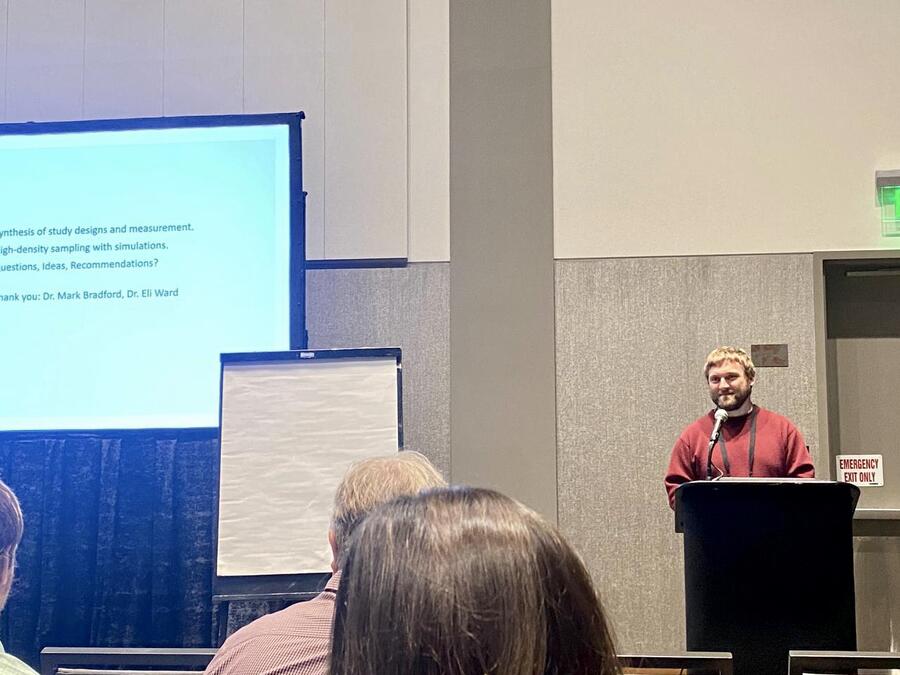
Michael Culbertson ’24 MFS faces a round of questions from the audience after his “Science Flash” talk on October 26, 2023. Audience members were curious about the implications of his research on their own carbon measurement work. Photo: Grace Bachmann ’23 MF.
Michael Freiburger ’23 MF shared the results of his capstone research done in collaboration with the Urban Resources Initiative (link is external) (URI), a community-forestry organization housed at TFS. Freiburger assessed the species diversity of planted trees across the city of New Haven, Connecticut, at multiple scales, from city-wide to neighborhood to city block. Freiburger’s goal was to understand whether different planting approaches support high levels of species diversity over time. Freiburger noted that tree diversity is important for a resilient urban canopy and attention must be paid to an equitable distribution of tree species across the urban landscape.
During the conference’s poster symposium, Julia Chen ’24 MF shared her work completed in collaboration with The Nature Conservancy Wyoming and the Ucross High Plains Stewardship Initiative (link is external) at YSE. Chen’s work – completed alongside Jake Barker ’24 MF – employed a systems thinking approach to Wyoming’s wood products economy. The goal was to identify more sustainable avenues for the state’s timber communities.
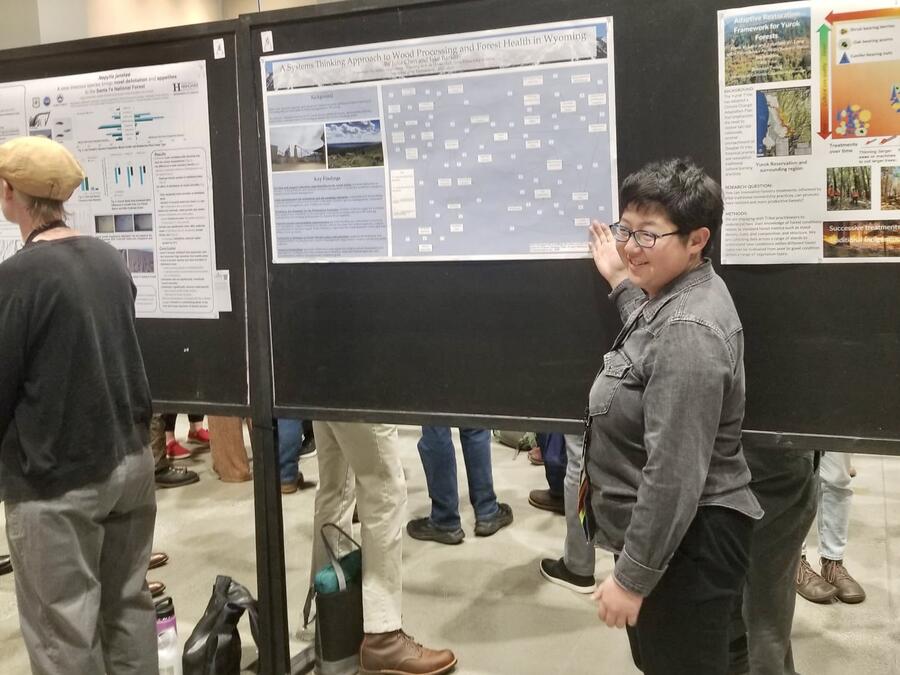
Julia Chen ’24 MF interacts with conference attendees during the poster symposium on October 27, 2023. Photo: Yeim We ’24 MFS.
A lengthy session on agroforestry on Friday morning culminated in a presentation by doctoral student Karam Sheban ’20 MF and Walker Cammack ’22 MF. The pair highlighted their work to establish the Northeast Forest Farmers Coalition, a collective that provides both technical assistance and knowledge to landowners throughout New England who hope to incorporate agroforestry practices into their land management. They discussed the practice of forest farming – where a valuable naturally occurring forest floor species, such as American ginseng, is protected or cultivated. These forest products provide additional income to landowners and support local markets.
The week in California was not just an opportunity for students to share their work and learn about other recent developments throughout the world of forestry, but also a valuable opportunity for forestry-minded individuals to connect personally and professionally. The Forest School – with support from the YSE Office of Development and Alumni Services – hosted its annual student and alumni reception. More than 70 alumni and current students seized the opportunity to meet and mingle, forging and rekindling valuable relationships. Led by Mark Ashton, Morris K. Jessup Professor of Silviculture and Senior Associate Dean of The Forest School, each attendee introduced their graduation year and areas of focus. The breadth of attendees stretched from the class of 1973 to the upcoming class of 2025, a testament to over a half century of Yale alumni committed to stewarding forestland worldwide.
